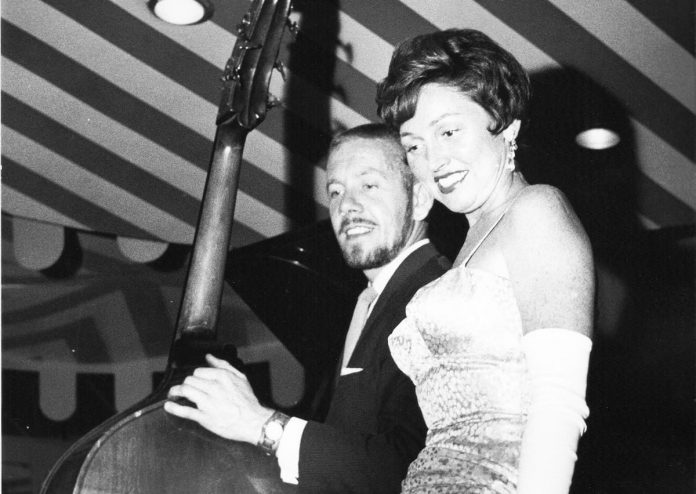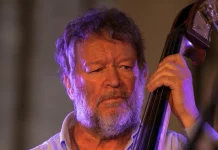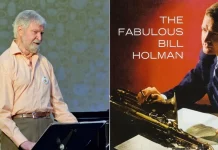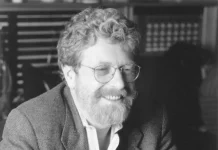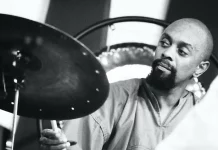Spike Heatley was the good friend I never met. We communicated on Facebook over the years and got to know each other. I reviewed his records, wrote a short feature about him for JJ and he bought my books, both jazz and fiction. Best of all were the jokes we shared, not on Facebook but by email as they were mostly blue, and I don’t mean the 12-bar variety. We also shared a north London birth location, him in Muswell Hill and me in Highbury. That made us lifelong Arsenal supporters, for better or worse.
Spike died in Dinan hospital in Brittany France on 10 November. He had been living in Brittany with his family since the 1990s when he retired. He did though, come out of retirement for gigs in Britain with some old mates about nine years ago. A recent meeting with old friend Martin Taylor almost persuaded him to come out again. The two did however play some duets together.
Brian, John “Spike” Heatley was born in Muswell Hill, London, 17 February 1933. Asked how he came to be known as Spike he recalled that he was one of the first young lads to have a crew haircut. The prominent short spikes gave him a name that lasted for the rest of his life.
His first professional music experience came in 1954/55 when he toured in the big bands of Harry Leader and Harry Bence. He then joined the Alan Ross Quartet and worked with them at the Palace Hotel, Karachi, Pakistan. Back in Britain in 1957 he was busy working in various trios with Dill Jones, Stepháne Grappelli, Helen Merrill and Dinah Washington. Then he worked with Eddie Thompson and in 1958, Vic Ash, visiting the USA with him.
Spike was the last bassist to play in the Jazz Couriers for the last few months of their existence in 1959, performing at the Vienna Jazz Festival. When Tubby Hayes announced he was breaking the group up to form a new quartet, Spike was the first bass player in that band, later replaced by Jeff Clyne.
Meanwhile Ronnie Scott was on the search for premises to start his own jazz club, securing the first of many loans, this one from his father-in-law and finally settling on a basement room in Soho that had once functioned as a cab-driver’s rest room. Scott wanted Spike for his opening night at the club and the bassist joined the Eddie Thompson Trio for the first performance in Gerrard Street.
Scott announced in a Melody Maker advert that the opening night would present music by Tubby Hayes and the Eddie Thompson trio with Spike on bass and Peter King on alto and that the grand opening performance would feature “the first appearance in a jazz club by Jack Parnell since the relief of Mafeking”. Scott was already warming up as a tenor player and comedian. Spike remained a member of the house rhythm section for some time and only left when Ronnie decided he needed to replace Thompson with a pianist whose reading ability was substantial.
It was at Scott’s old club that John Dankworth first heard Spike play and shortly after recruited him for his new big band. Spike went through a lean spell when he left Dankworth two years later but soon formed a new trio with Brian Lemon and John Marshall accompanying singer Salena Jones. The trio played at Scott’s as second feature with the Kenny Clarke/Francy Boland orchestra and were held over to play opposite the Bill Evans Trio for a further four weeks.
An idea of just how good Spike Heatley was at this time can be seen by the comments of Marian McPartland, who toured with him and drummer Ronnie Stephenson. She said: “They are just great, they really swing, listen hard and don’t get in the way. They read well, no problem with keys. Spike read much better than the average stateside bassist.” Pianist Mary Lou Williams said much the same thing, pointing out that with a bass player she needed to talk things over and rehearse for a few days. She said they had one short rehearsal and that she was “lucky to have Spike, a really good bass player”. She added: “If I’d been working with Oscar Pettiford, we would have needed a week beforehand to really get together.”
During the 1970s Spike was busy with studio work to supplement his income and backed singers such as Donovan and Rod Stewart. He also worked for some time in television with the Play Away programme. He played frequently too with The Bebop Preservation Society group. When Tubby Hayes became extremely ill and had to have a valve replaced in his heart, it slowed him down – for a while. Spike invited him to join the BPS for a time, just to play tenor and have no other worries. It worked well for a brief time but Tubby, being Tubby, began to play more and more, get much more involved and finished up back in hospital where he died following a second heart operation.
This was in the 1980s and Spike himself was slowing down and in need of a rest. Over the years he had played and toured with his friend Bill Le Sage, Charlie Shavers, Jay McShann and Teddy Wilson along with many others. He had backed singers Anita O’Day and June Christy. Regarding the latter, he told me that she was lovely to work with, but he wasn’t happy because he didn’t think her husband treated her very well. That showed the human, caring side of Spike Heatley.
In 1991 Spike retired and moved to Brittany where he lived with his wife and children for the rest of his life. He couldn’t stay in retirement too long however and was tempted back to London in 2013 and again in 2014 when he made successful tours around the south-east of England with his trio and tenor saxist Art Themen. While living in France Spike still managed to record with a line-up including Alan Barnes and drummer Malcolm Mortimore. These were done on visits to the UK. Some of his last work in Britain was with the Great Guitars combo which featured, at one time or another, Charlie Byrd, Herb Ellis, Barney Kessel and Martin Taylor. Spike did pick up his bass again to play at home with Martin Taylor when the guitarist visited and kept his hand in, playing bass regularly at home and staying in touch with the scene through his Jazz Journal subscription.
Spike Heatley was one of the great jazz bass players, perhaps not as appreciated as he should have been, but he will be remembered for his substantial contribution to jazz and through his many recorded performances. Spike is survived by his wife Stevie, his daughters Merrill and Nancy and his son Danny.
RIP, Spike, old mate I never met.

